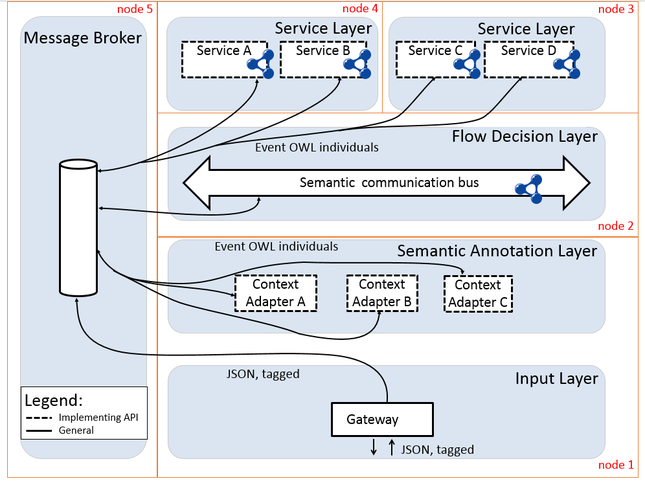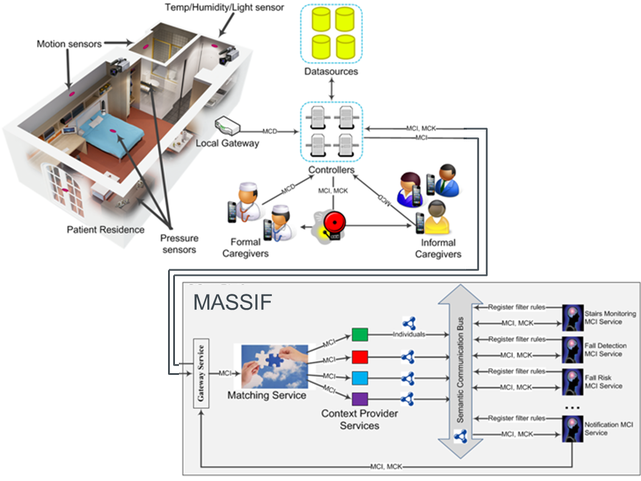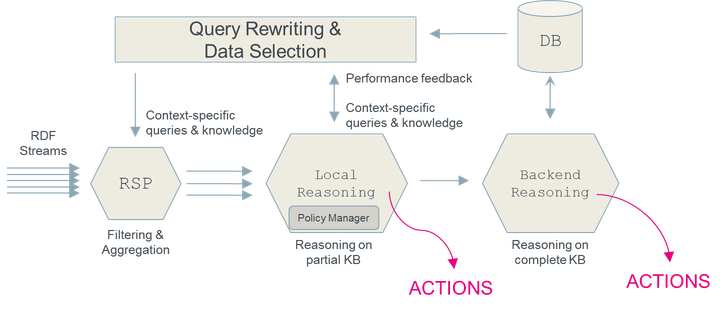Scalable Knowledge Management & Reasoning for IoT
In recent years, there is an increasing interest in internet connected devices & sensors, called the Internet of Things (IoT). These IoT devices constantly generate data that describe their state and the state of the context or environment they are in. Information available on social media and observations & measurements provided by people also amount to a wealth of data describing the physical world. The advantage of IoT is that these data streams originating from various sources can be combined & processed to derive high-level conclusions about the environment, the profile of the user and the current situation. This enables devices & applications to achieve situation- and context-awareness, allows advanced monitoring of the environment and better support of human users in their daily activities. This led to a wealth of new applications in domains like smart cities, pervasive healthcare, smart energy grids, smart buildings and environmental sensing.
Cisco predicted that by 2020 the Internet will contain over 50 billion smart objects. The data streams generated by these IoT devices are not only voluminous, but are also a heterogeneous, possibly noisy & incomplete set of time-varying data elements. As such, it is a challenging task to integrate, interpret and analyze the data streams on the fly to derive actionable insights.
Semantically enriching the data facilitates the consolidation of these data streams. It imposes a common, machine-interpretable data representation. It also makes the properties of the device and the context in which the data was gathered explicit. Moreover, it enables the integration of these streams with background or prior knowledge, e.g., the medical history of a patient in case of pervasive applications or the layout of the city and on-going events in case of smart cities.
The main research objective is to foresee a semantic reasoning platform and accompanying algorithms that allow the flexible design of semantic and performant IoT services that are deployed in a scalable fashion such that actionable insights can be derived in a timely fashion from the huge stream of IoT data.
Specifically, our research efforts focus on the following topics:
- Design and development of the MASSIF Platform, a data-driven platform for the flexible design of semantic services and the scalable reasoning on semantic data
- Algorithms for scalable and performant semantic reasoning on heterogeneous and volatile data
- Context-dependent and adaptive stream reasoning techniques
- Techniques to combine semantic reasoning and complex event processing
- Distributed and cascading reasoning platform
- Approximate and incremental reasoning techniques
Staff
Filip De Turck, Femke Ongenae, Erik Mannens
Researchers
Pieter Bonte, Alexander Dejonghe, Jeroen Schaballi, Dörthe Arndt, Joachim Van Herwegen
Projects
- SBO DiSSeCt: Distributed Semantic software solutions for complex Service Composition
- ICON CONAMO: CONtinuous Athlete Monitoring
- ICON OCareCloudS: Organizing Care through trusted Cloudy-like Services
- ICON FallRisk: Social-aware and context-aware multi-sensor fall detection system
- O&O ORCA: Ontology based Reasoning for nurse Call
Key publications
- Pieter Bonte, Femke Ongenae, Femke De Backere, Jeroen Schaballie, Dörthe Arndt, Stijn Verstichel, Erik Mannens, Rik Van de Walle, Filip De Turck, The MASSIF platform: a modular and semantic platform for the development of flexible IoT services, Knowledge and Information Systems, 2016.
- Alexander Dejonghe, Towards Scalable Federated Context-Aware Stream Reasoning, In Proc. of the 13th International Extended Semantic Web Conference (ESWC), Heraklion, Greece, May 29 – June 2, 2016.
- Pieter Bonte, Femke Ongenae, Filip De Turck, Generic semantic platform for the user-friendly development of intelligent IoT services, In Proc. of the International Semantic Web Conference (ISWC), Kobe, Japan, 17-21 October, 2016.
- Femke Ongenae, Jeroen Famaey, Stijn Verstichel, Saar De Zutter, Steven Latré, Ann Ackaert, Piet Verhoeve, Filip De Turck, Ambient-aware continuous care through semantic context dissemination, BMC medical informatics and decision making, 14(1), 2014.
- Femke De Backere, Femke Ongenae, Floris Van den Abeele, Jelle Nelis, Pieter Bonte, Eli Clement, Matthew Philpott, Jeroen Hoebeke, Stijn Verstichel, Ann Ackaert, Filip De Turck, Towards a social and context-aware multi-sensor fall detection and risk assessment platform. Computers in Biology and Medicine, 64, pp. 307–320, 2015.
- Pieter Bonte, Femke Ongenae, Jeroen Schaballie, Ben De Meester, Dörthe Arndt, Wim Dereuddre, Jabran Bhatti, Stijn Verstichel, Ruben Verborgh, Rik Van de Walle, Erik Mannens, Filip De Turck, Evaluation and optimized usage of OWL 2 reasoners in an event-based eHealth context, In Proc. of the 4th OWL Reasoner (ORE) Workshop, 2015.


